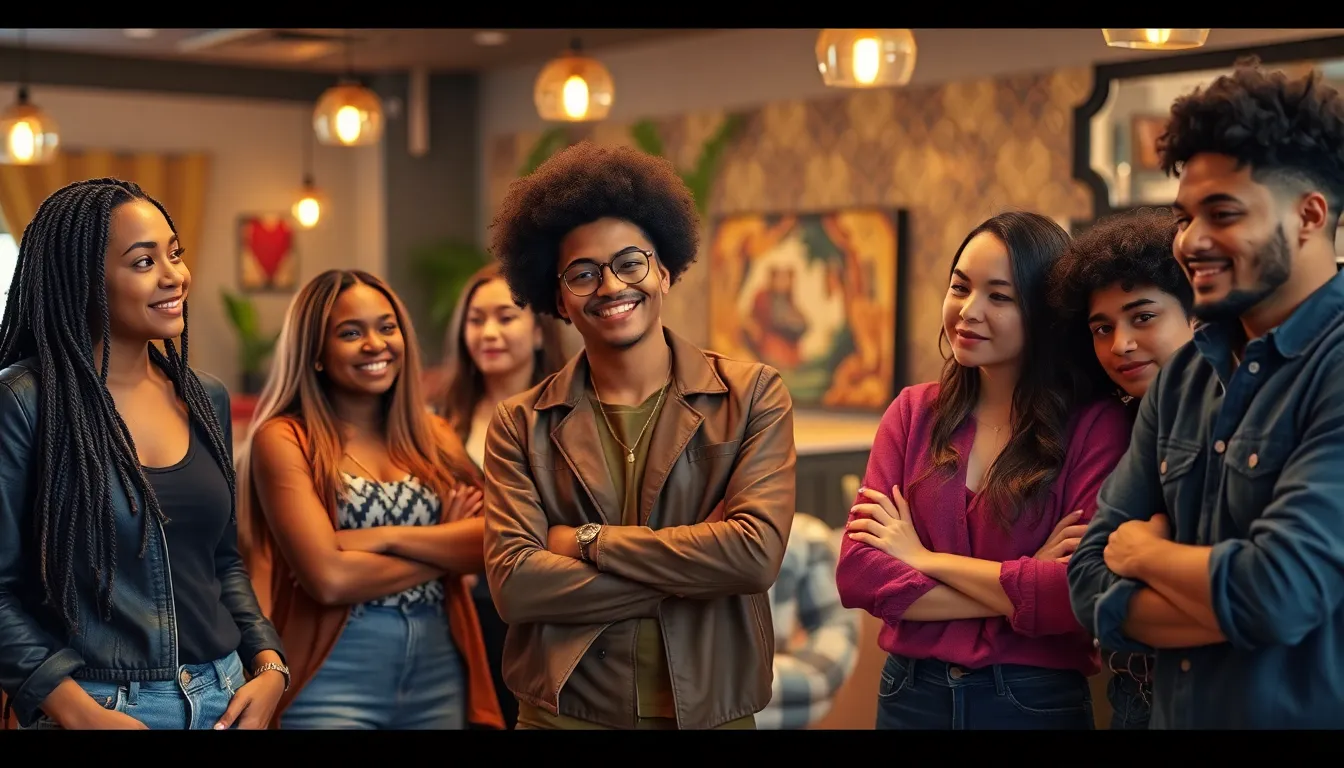We’ve all been there – that uncomfortable moment when someone’s behavior toward us feels off and we can’t quite put our finger on why. While it’s natural to wonder if our appearance might be triggering negative reactions in others, recognizing the signs of appearance-based jealousy can help us navigate these tricky social situations with confidence.
Beauty-related envy often manifests in subtle ways that can leave us questioning our instincts. From backhanded compliments to deliberate exclusion from social events, jealous individuals rarely express their feelings directly. Instead, they deploy passive-aggressive tactics that can make us feel confused and self-conscious about our looks.
Understanding these behavioral patterns isn’t about feeding our ego – it’s about protecting our mental well-being and maintaining healthy relationships. When we can identify the warning signs of appearance-based jealousy, we’re better equipped to respond appropriately and surround ourselves with genuinely supportive people who celebrate our confidence rather than resent it.
Subtle Body Language Cues That Reveal Jealousy
Body language speaks volumes about someone’s true feelings toward our appearance. These nonverbal signals often betray jealous emotions that people attempt to conceal through their words.
Fake Smiles and Forced Compliments
Genuine smiles engage the entire face and create crinkles around the eyes, while fake smiles remain confined to the mouth area. Jealous individuals frequently flash tight-lipped grins that don’t reach their eyes when complimenting our appearance.
Their compliments sound rehearsed or mechanical rather than spontaneous and heartfelt. We notice phrases like “that’s nice” delivered with strained vocal tones instead of enthusiastic responses.
Physical tension accompanies these forced interactions through clenched jaws or rigid facial muscles. The timing feels off too – compliments arrive after noticeable pauses as if the person’s mentally wrestling with their words.
Avoiding Eye Contact or Intense Staring
Eye contact patterns shift dramatically when someone feels jealous of our looks. Some people completely avoid looking at us during conversations, focusing on their phones or scanning the room instead.
Others swing to the opposite extreme with prolonged stares that feel invasive and uncomfortable. These intense gazes often carry judgmental undertones rather than admiration or friendly interest.
Quick glances followed by immediate look-aways reveal internal conflict between curiosity and resentment. We catch them studying our outfit or appearance then rapidly shifting their attention elsewhere when noticed.
Defensive Posture When You’re Around
Crossed arms create physical barriers that signal emotional distance and defensiveness. Jealous individuals unconsciously shield themselves from us through closed-off body positioning.
Shoulder positioning changes too – they turn slightly away even during direct conversations, creating subtle angles that reduce face-to-face interaction. This sideways stance suggests discomfort with our presence.
Personal space boundaries expand as jealous people maintain greater physical distances during group settings. They position themselves at table ends or room edges rather than sitting directly beside us.
Fidgeting behaviors increase through hair touching, jewelry adjusting, or clothing smoothing when we enter their vicinity. These self-soothing gestures indicate heightened anxiety triggered by our appearance.
Verbal Signs of Appearance-Based Jealousy
Jealous individuals often express their envy through carefully chosen words that mask their true feelings. These verbal indicators reveal deeper insecurities about our appearance while maintaining a facade of friendliness.
Backhanded Compliments About Your Looks
These comments appear supportive on the surface but contain underlying negativity designed to undermine our confidence. Research shows that remarks like “You look so good for your age” or “It’s amazing you can pull off that style” serve to minimize our appearance while seeming friendly. The compliments include qualifiers that suggest our looks are surprising or unusual rather than naturally beautiful.
Expert analysis reveals that these statements aim to chip away at our self-esteem through subtle manipulation. We might hear phrases that question our style choices or suggest we’re trying too hard to look good. The speaker delivers these comments with a tone that seems caring but leaves us feeling uncertain about whether we’ve actually been complimented.
Constantly Comparing Themselves to You
Jealous people frequently make statements that position their appearance against ours in unfavorable comparisons. Comments such as “Your skin is glowier than mine” or “I could never look that good in that outfit” may sound like compliments but actually reflect their insecurity and envy. These comparisons serve as a way for them to highlight what they perceive as their own shortcomings.
The behavior manifests through repetitive statements that draw attention to differences in our appearances. We notice they bring up these comparisons in group settings to draw others into their narrative of inadequacy. Their words create an atmosphere where our natural beauty becomes a source of discomfort rather than celebration.
Downplaying Your Appearance or Style Choices
This pattern involves minimizing our beauty-related achievements or making light of our efforts to look good. When someone else compliments us, a jealous person might respond with “Oh, anyone would look good with that hairstyle” or “It’s not that big of a deal.” These remarks aim to reduce the significance of our appearance and the effort we put into our style.
The downplaying extends to dismissing compliments we receive from others or attributing our looks to external factors rather than our natural beauty. We might hear them suggest that our appearance results from expensive products, professional help, or favorable lighting rather than acknowledging our inherent attractiveness. Their words attempt to strip away the validity of positive feedback we receive about our looks.
Social Media Behavior That Screams Jealousy
Digital platforms reveal jealousy through exact patterns that become unmistakable once we recognize them. Online behaviors often expose feelings that people work hard to conceal in face-to-face interactions.
Never Liking or Commenting on Your Photos
Consistent silence from someone who actively engages with other people’s content signals potential jealousy about our appearance. This person regularly likes and comments on mutual friends’ posts but completely ignores our photos, especially those showcasing our looks.
Their engagement patterns create noticeable gaps when it comes to our content. We notice they view our stories within minutes of posting yet never react to posts featuring our appearance or achievements related to beauty.
Close friends or family members who suddenly stop acknowledging our photos while maintaining active social media presence elsewhere demonstrate this jealousy-driven avoidance. The contrast becomes particularly obvious during special occasions when our posts receive attention from others but remain untouched by this exact person.
Copying Your Style or Poses
Imitation without acknowledgment reveals deep-seated envy about our aesthetic choices. These individuals replicate our outfits, poses, or photography angles shortly after we post similar content, creating obvious parallels that can’t be coincidental.
Their mimicry extends beyond occasional similarities to systematic copying of our visual presentation. We spot them wearing nearly identical outfits, using the same photo locations, or adopting poses we’ve recently shared.
Fashion choices that we’ve made unique to our style suddenly appear across their profiles with suspicious timing. They recreate our makeup looks, hairstyles, or accessory combinations while never crediting us as inspiration for these sudden style changes.
Making Passive-Aggressive Comments Online
Subtle negativity disguised as engagement exposes jealousy through carefully crafted responses to our posts. These comments appear supportive on surface level but contain underlying criticism designed to undermine our confidence about our appearance.
Their responses include phrases like “must be nice to have time for all that” or “some people are just naturally lucky” when we share photos or achievements. The language creates distance between our success and any personal effort or natural beauty we possess.
Backhanded compliments dominate their interaction style with comments such as “you’re so brave to post that” or “confidence is everything.” These responses sound encouraging but actually question our judgment or suggest we’re overcompensating for perceived flaws.
How Jealous People Try to Undermine Your Confidence
Jealous individuals employ strategic tactics to chip away at our self-assurance about our appearance. These deliberate actions target our confidence through seemingly innocent suggestions and observations.
Pointing Out Minor Flaws
Constantly criticizing physical appearance represents one of the most direct methods jealous people use to undermine our confidence. We notice these individuals focus intensely on imperfections that others rarely mention or observe. Their comments often target areas we feel sensitive about, suggesting they’ve been watching and cataloging our perceived weaknesses.
Mentioning flaws in public settings amplifies the damage these comments cause. Jealous people choose moments when others can hear their observations, maximizing the potential embarrassment we might experience. Examples include pointing out a blemish during group conversations or commenting on weight fluctuations in front of mutual friends.
Displaying negative body language accompanies these verbal attacks on our appearance. We observe eye rolls, smirks, and dismissive gestures when jealous individuals make these critical observations. Their facial expressions communicate disapproval even when their words attempt to sound helpful or concerned.
Suggesting Unflattering Changes
Recommending unflattering modifications to our appearance disguises jealousy as helpful advice. These suggestions often involve dramatic alterations that would diminish our most attractive features. Examples include encouraging us to cut beautiful long hair significantly shorter or suggesting clothing styles that don’t complement our body type.
Pushing for changes that contradict our established style reveals the true motive behind these recommendations. Jealous individuals propose modifications that would make us blend in rather than stand out. We recognize this pattern when someone consistently suggests alterations that would make us less noticeable or attractive.
Timing these suggestions strategically increases their potential impact on our confidence. Jealous people often make these recommendations before important events or social gatherings. Their goal involves planting seeds of doubt about our appearance choices when we’re already feeling vulnerable or excited about looking our best.
Spreading Rumors About Your Appearance
Creating false narratives about our beauty routine represents an extreme form of appearance-based jealousy. These rumors often suggest our looks result from artificial enhancements rather than natural attributes. Examples include spreading claims about cosmetic procedures we haven’t had or suggesting our appearance relies heavily on makeup or filters.
Questioning the authenticity of our appearance through gossip damages our reputation within social circles. Jealous individuals plant doubts about whether our beauty is genuine or enhanced through various means. We discover these rumors often circulate through mutual friends who eventually share what they’ve heard.
Attributing our attractiveness to external factors minimizes our natural beauty in others’ minds. These rumors typically suggest our appearance results from expensive treatments, professional styling, or genetic luck rather than personal care and effort. Jealous people use this tactic to make our beauty seem less impressive or attainable to others who might admire us.
Changes in Relationship Dynamics
When someone feels envious of our appearance, they often alter their behavior patterns in ways that create noticeable shifts in our relationship dynamics. These changes typically emerge gradually but become increasingly apparent through their social interactions with us.
Becoming Distant or Cold Around You
Distance manifests as one of the most telling indicators when jealousy affects someone’s perception of our looks. People experiencing appearance-related envy frequently withdraw emotionally from us even though previously maintaining close connections. They respond to our messages with shorter replies than before, avoiding personal topics that once sparked captivating conversations.
Physical proximity changes become evident during group gatherings when jealous individuals position themselves farther away from us. Their conversations with us feel forced and lack the warmth they display with others. Body language shifts dramatically as they maintain crossed arms during interactions and offer brief responses to questions about our appearance or style choices.
Invitations to casual hangouts decrease significantly as they create emotional barriers between us. They may cite busy schedules repeatedly while maintaining active social lives with other friends. Text conversations that previously included enthusiastic responses now receive delayed replies with minimal engagement.
Excluding You from Social Events
Social exclusion represents a calculated response when jealousy centers on our physical appearance. Jealous individuals strategically omit us from gatherings where our looks might receive attention or compliments from others. They organize group activities without extending invitations even though including us in similar events previously.
Party planning becomes selective as they curate guest lists that minimize our presence at appearance-focused occasions. Birthday celebrations, shopping trips, and photo opportunities suddenly exclude us from their social calendar. They provide vague explanations about space limitations or assume we’re unavailable without actually asking about our schedule.
Group photos from events we weren’t invited to appear on social media platforms, making the exclusion obvious and intentional. These posts often showcase activities we would typically enjoy, highlighting the deliberate nature of our omission. They may mention the events in passing conversations as if we were aware of them beforehand.
Bringing Up Your Past Looks or Weight
References to our previous appearance become frequent conversation topics when jealousy influences someone’s behavior toward us. They consistently mention photos from years ago when we looked different, often framing these comparisons as casual observations. Comments about weight fluctuations surface regularly during discussions about health, fitness, or lifestyle changes.
Past hairstyles, fashion choices, or makeup preferences become subjects they revisit repeatedly in group settings. These mentions often carry subtle implications that our current appearance represents a temporary phase rather than natural beauty. They may suggest that our previous look was more authentic or relatable compared to our present appearance.
Childhood or teenage photos become ammunition for undermining our current confidence levels. They share old images during social gatherings while making comments about how much we’ve changed physically. These behaviors reveal their discomfort with our current appearance and their desire to diminish the positive attention we receive from others.
Professional and Academic Jealousy Signs
Workplace environments often reveal the most calculated forms of appearance-based jealousy. Colleagues mask their envy behind professional interactions while systematically undermining our achievements and contributions.
Dismissing Your Success as “Pretty Privilege”
Jealous coworkers frequently attribute our professional accomplishments to physical appearance rather than skill or dedication. They minimize our expertise by suggesting we received promotions, raises, or opportunities solely because of our looks. These individuals make comments like “must be nice to have doors opened for you” when we achieve career milestones.
Academic settings present similar challenges where classmates or colleagues dismiss our research, presentations, or leadership roles as superficial advantages. They question our qualifications during meetings and suggest our ideas lack substance. Professional jealousy manifests through subtle implications that our success stems from attractiveness rather than competence.
Making Appearance-Related Comments at Work
Envious colleagues deliver backhanded compliments disguised as professional observations about our appearance. They make unsolicited remarks about our clothing choices, makeup, or hairstyle during important meetings or presentations. These comments serve to redirect attention from our work performance to our physical attributes.
Workplace jealousy appears through seemingly innocent questions about our beauty routine or wardrobe expenses. Coworkers might suggest our appearance is “too distracting” for certain clients or situations. They frame these observations as constructive feedback while actually attempting to make us self-conscious about our professional image.
Treating You Differently Than Others
Jealous colleagues systematically exclude us from important meetings, networking events, or team-building activities where our presence might draw positive attention. They provide vague explanations for our exclusion from crucial discussions or decision-making processes. These individuals create separate communication channels that deliberately omit us from relevant workplace information.
Professional environments reveal jealousy through inconsistent treatment compared to other team members. Colleagues might interrupt us more frequently during presentations or dismiss our contributions with minimal acknowledgment. They assign us tasks that minimize our visibility or interaction with senior management and important clients.
How to Handle Someone Who’s Jealous of Your Looks
Maintain confidence in your appearance even though negative comments from jealous individuals. Our self-esteem remains the foundation for handling these challenging interactions effectively.
Set clear boundaries when someone crosses the line with criticism or uncomfortable remarks about our looks. Politely but firmly address inappropriate behaviors by stating our limits directly.
Limit interactions with people who consistently make us feel uncomfortable or belittled about our appearance. Reducing contact protects our mental well-being from toxic dynamics.
Seek emotional support from trusted friends or family members who understand the situation. Talking through these experiences helps us process the impact of jealous behaviors on our confidence.
Surround ourselves with positive influences who celebrate our appearance rather than criticize it. Focusing on self-care routines reinforces our confidence while building resilience against negativity.
Document patterns of jealous behavior if the situation escalates or affects our professional environment. Recording exact incidents provides clarity when addressing persistent issues.
Avoid captivating in defensive arguments about our appearance with jealous individuals. Refusing to justify our looks prevents us from getting drawn into unproductive conversations.
Practice gray rock technique by responding minimally to backhanded compliments or appearance-related criticisms. Neutral responses reduce the satisfaction jealous people gain from negative reactions.
Focus on personal growth rather than trying to change someone else’s jealous mindset. Investing energy in our own development proves more beneficial than attempting to fix toxic relationships.
Consider professional help if dealing with persistent jealousy significantly impacts our mental health or daily functioning. Therapists provide specialized strategies for managing these complex social dynamics.
Conclusion
Recognizing jealousy about our appearance isn’t about vanity—it’s about understanding the dynamics that shape our relationships and social interactions. When we’re aware of these patterns we can make informed decisions about who deserves our energy and attention.
The key is maintaining our confidence while protecting our mental health. We don’t need to dim our light to make others comfortable but we can choose how to respond when jealousy surfaces.
Remember that jealousy says more about the other person’s insecurities than it does about us. By staying true to ourselves and surrounding ourselves with genuinely supportive people we create an environment where our natural beauty can be celebrated rather than resented.
Trust your instincts when something feels off. Our intuition often picks up on jealous behavior before our conscious mind does and honoring those feelings helps us navigate these challenging social situations with grace and wisdom.
Frequently Asked Questions
How can I tell if someone is jealous of my appearance?
Look for subtle behaviors like backhanded compliments, avoiding eye contact, fake smiles, and defensive body language. Jealous individuals often fidget more around you or engage in intense staring. They may also exclude you from social gatherings or make unfavorable comparisons about your looks while masking their envy through carefully chosen words.
What are the signs of appearance-based jealousy on social media?
Jealous people on social media typically ignore your photos while engaging with others’ posts, copy your style without acknowledgment, and leave passive-aggressive comments with underlying criticism. They may also avoid liking or commenting on posts where you look particularly good, showing inconsistent engagement patterns compared to your other content.
How does jealousy affect workplace relationships?
In professional settings, jealous colleagues may attribute your success to “pretty privilege” rather than your skills, exclude you from important discussions, or make backhanded comments about your appearance during meetings. They might create separate communication channels that leave you out and treat you differently than other coworkers.
What should I do when someone is jealous of my appearance?
Maintain confidence in yourself, set clear boundaries against inappropriate comments, and limit contact with those who consistently belittle you. Seek support from trusted friends, document patterns of jealous behavior, and focus on personal growth rather than trying to change others. Consider professional help if the jealousy significantly impacts your mental health.
How do jealous people try to undermine my confidence?
Jealous individuals often point out minor flaws, suggest unflattering changes to your appearance, and make frequent references to your past appearance or weight. They may spread rumors about your beauty routine and provide vague explanations when excluding you from social events where your looks might receive attention.
Can jealousy change close friendships?
Yes, appearance-based jealousy can create emotional distance in friendships. Jealous friends may withdraw from close connections, respond with shorter replies, and exclude you from gatherings. They might frame comparisons about your past appearance as casual observations while actually trying to undermine your current confidence and self-esteem.

















